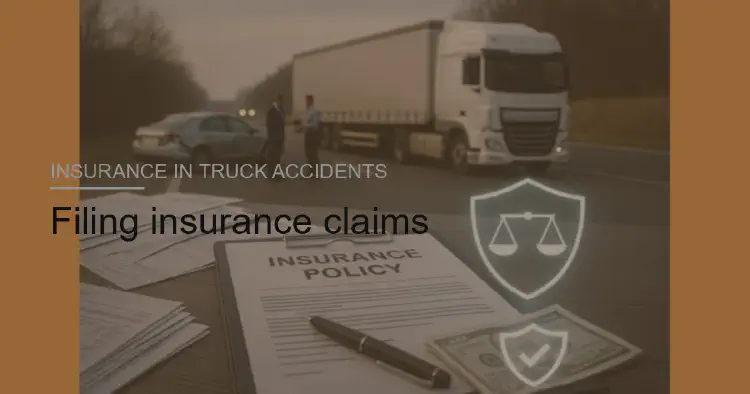Filing insurance claims
After a truck accident, filing an insurance claim is the first step toward financial recovery. The process is complex due to multiple policies and high-value damages, requiring careful attention to detail.
- Truck Accident Law Team
- 2 min read
Article 5 of 6 in Insurance in Truck Accidents/

Filing Insurance Claims in Truck Accident Cases
Step 1: Identify All Relevant Insurance Policies
- Truck accidents often involve several policies, including:
- The trucking company’s primary liability insurance.
- Cargo insurance if freight is damaged.
- The driver’s personal auto insurance (if applicable).
- Victim’s own uninsured/underinsured motorist coverage.
Step 2: Notify the Insurance Company
- Most insurers require prompt notification of a claim.
- Delays can jeopardize coverage.
- The notice typically includes accident details, involved parties, and preliminary injury information.
Step 3: Submit Documentation
- Police reports, medical records, repair estimates, and photos/videos of the accident scene.
- Proof of lost wages and other financial losses.
Step 4: Cooperate With Investigation (Cautiously)
- Insurance adjusters will investigate liability and damages.
- Victims should avoid giving recorded statements without legal advice, as these may be used to reduce claims.
Step 5: Claim Evaluation
- The insurer reviews evidence and determines liability.
- May request additional documentation or medical exams.
Step 6: Settlement Negotiation
- Insurers typically offer an initial settlement.
- Victims should carefully review with an attorney to ensure it covers current and future expenses.
Step 7: Appeal or Litigation if Denied
- If the claim is denied or undervalued, victims can:
- File an internal appeal.
- Pursue litigation for breach of contract or bad faith practices.
Legal Importance
- Filing correctly ensures access to compensation.
- Mistakes, delays, or incomplete documentation may give insurers grounds to deny claims.
- Attorneys streamline the process, manage communications, and safeguard victims’ rights.
Summary: Filing an insurance claim after a truck accident involves identifying all policies, submitting thorough documentation, and negotiating fairly. With insurers often seeking to minimize payouts, legal guidance is crucial for ensuring full and timely compensation.
You might also like:
- Tags:
- Truck Accidents
- Trucking Company
- Legal Importance
- Police Reports
- Medical Records
- Lost Wages
- Liability Damages
- Bad Faith
- Insurance Adjusters
- Liability Insurance
- Accident Scene
- Insurance Policies
- Cargo Insurance
- Financial Losses
- Legal Advice
- Documentation Police Reports
- Accident Cases Step
- Primary Liability Insurance
- Avoid Giving Recorded
- Giving Recorded Statements
- Insurance Adjusters Investigate
- Legal Importance Filing
- Police Reports Medical
- Reports Medical Records
- Claims Truck Accident
- Personal Auto Insurance